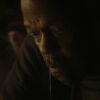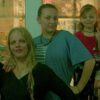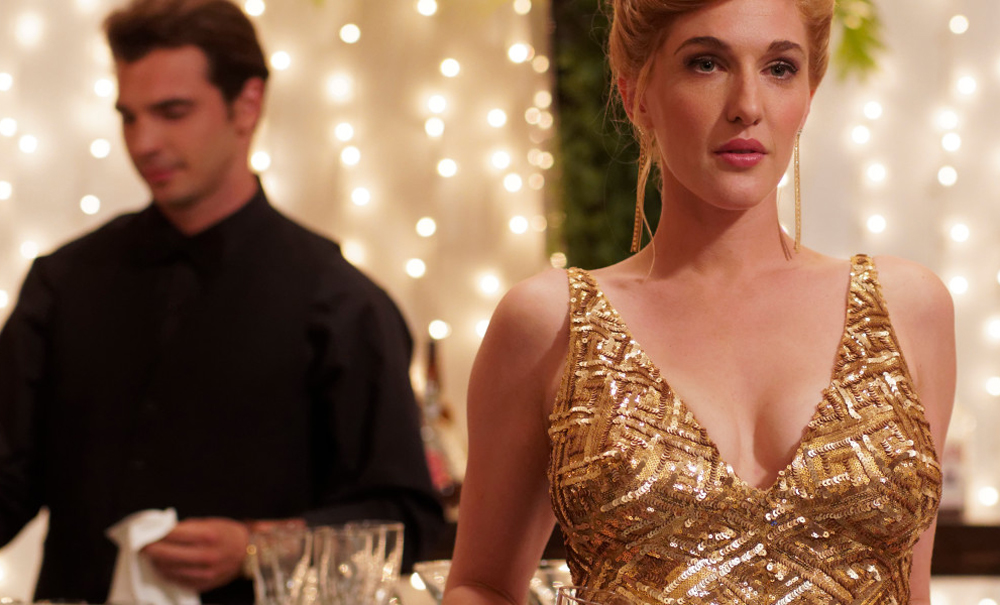It doesn’t go the way you think it would, the opening scene of Anne Émond’s “Nelly.” The young girl who would grow up to be Nelly Arcan, the Canadian literary sensation born Isabelle Fortier, can be seen at a talent show in front of a sparkly blue curtain, waiting for her chance to sing on stage, though the song has already started. Her voice trembles when she finally does join a chorus of the nostalgic Dalida track, eventually growing stronger before a look to the crowd and her parents pushes her back into silence, leaving just a moment of pure exuberance in which she could be completely herself before the song carries on without her.
“It was interesting how very, very young you understand that,” says Émond, of that arresting introduction after spending two years puzzling over how to bring Arcan’s story to the screen. “As a child, she’s from a good family, [with] good parents, but most parents who [present their children on stage] very, very young in society, you learn don’t be too loud and don’t take too much space, so I thought [the scene] was important. It would set a tone for how she would be in a cage for the rest of her life in everybody’s [eyes].”
It’s hard to say whether “Nelly,” when it’s released this Friday in Montreal, is more eagerly anticipated in its native country because of its subject, who rose to fame on the back of two incendiary novels based on her experiences as a prostitute in her twenties before taking her own life at 36, by which time she was more well-known for appearing on talk shows largely playing to the persona she had helped build in the public consciousness, or the filmmaker behind it, the brilliant writer/director whose films grow more daring and distinctive each time out.
After boldly exploring the connection between emotional and physical intimacy in her first film “Nuit #1” and subsequently tracking the ineffable psychic effects of a father’s suicide on his family, especially his son in the heartrending “Our Loved Ones,” Émond is tasked with depicting a life in “Nelly” where so much of it was a protective illusion and rather than envisioning Arcan in a straightforward way, creates a prism in which you observe the author in multiple lights – as a vivid and clever wordsmith, a lady of the night who hides her intelligence to please her clients, a confident seductress who thinks nothing of slinking up to the center of attention at a ball and pulling him onto the dance floor, a teen girl who learns boys’ attentions can be fleeting, a woman in her thirties who finds that she can’t shake the painful image she has of herself and above all else, someone in search of peace of mind that is constantly out of reach when her imagination can only take her so far.
Having been privileged to be able to speak to Émond for each of her three films, it always takes a moment to associate the warm, unassuming writer/director with her work, which has been naturally dark as it often attempts to reconcile ugly human impulses with people who desperately want to be their best selves, but you quickly realize it’s her curiosity that drives her desire to see people in full, accepting their complicated nature as part of what makes them interesting and unique. With “Nelly,” Émond has outdone herself, not only realizing Arcan in all her contradictions (with a remarkable, multifaceted performance from newcomer Mylène Mackay), but finding in her story the seeds to take on big, ambitious ideas about identity, gender and creativity in riveting and provocative ways. While the filmmaker was at the Palm Springs Film Festival recently, where the staff member’s request of the audience to “be careful” if they had pacemakers held extra resonance for the pulse-quickening drama, Émond spoke about figuring out the crystalline portrait of the woman she so admired, her thorough research that led to even more questions, and the ways in which she could identify with her subject and hopes others will too.

I’m ten years younger [than Nelly], but I have always been a fan. I was 24 when the first novel “Putain (Whore)” came out, and I read it and [thought], “Oh my God, what a great talent. She’s important.” I was a fan of the writing, but I was also skeptical of how she would present herself, [because] the public image of her would irritate me a little bit because she has the fake lips, the fake blonde hair, the fake boobs, like Botox everywhere. [I wondered,] Why are you doing that? In a way, I understood because when you read the books, you understand she wants to please everyone.
But I was fascinated by her and when she died, I remember I learned it on Facebook and I cried. It was a friend and a sister [passing], even if I never met her because her writing was so intimate. I was sad and angry because she wrote about her suicide a thousand times and we did nothing because what can you do? I wondered, “Is it possible to be a woman, to be an artist, to be successful, and to go through life?” I was like, “Is this me in ten years? I don’t know. I took it personally, so that’s why I decided to make a film about her.
In a situation like this where the truth about her life is so hazy, was there a truth you could hang onto to build the film around?
In fact, no. This woman is a mystery, to be honest. When I decided to work on [this film], I reread all the books and I met a lot of people around her – ex-boyfriends, friends, her publisher, her psychiatrists…even her co-workers when she was a sex worker. After I did that research, I was completely lost. The mystery was even bigger than at the beginning of my research. So I first wrote a script that was like a standard biopic — where she’s born in childhood, then her school [years], and prostitution and the books. After one year of work, I reread it and it was very boring. And it was not the truth because I think this character is chaotic, intense and crazy, so the film had to be a little bit like she was and not so conventional. I decided to rewrite everything and expose this character in different women because what I learned [was] she was a different person depending on who she was talking to.
Did her style of writing influence the style of the film?
It couldn’t be conventional in the form because her books were unconventional. Her writing, there is no point – like it’s pages and pages and it never stops. It’s very chaotic and it’s a little bit like a nightmare. You read the book and it’s page 100, and you go, “Oh my God, please let me get out of this!” She’s very, very dark and I’m trying to just take the viewer and bring them down with her in a way, so after a while, you’re just like, “Where am I? How can I get out of this?” The writing was really inspiring to me and in fact, a lot of the voiceover in the film is from the books.

It’s tough to do because she’s already dead in a way, so it’s like, we’ll see why she’s dying so slowly. In her books, there’s no progress. There’s no narrative – it’s mood and impressions, so I wanted a little bit of progression in the film, but very, very small. I wanted her to be okay at the beginning, and then you slowly realize that everything that helps her will finally kill her. In writing, it’s good [for her] to find a way to express herself, but it’s coming with the anxiety of the critics and being in the eye of the public. It’s the same for success – she needs it, but she cares [when] it ends — and for the prostitution because she needs the desire of all those men – it makes her feel alive, but slowly of course, it kills her. So it [becomes] a very simple story. She just cannot live. She’s not able.
There may be no distinction to you as a filmmaker, but knowing how important environments are to you – did you see the different places of extensions of who this person was emotionally as opposed to places that made a mark on her? I felt like you can see her emotions in the sets.
Almost nothing is possible [in reality that you see] in the sets of the film — it’s over the top. When she writes, it’s almost the office of Virginia Woolf. Like no one [real] works in this kind of place. There’s books everywhere – it’s a set, almost like what a writer [would envision themselves ideally] to be in a huge office, being alone like that and of course, it’s not true. She probably wrote her book in a Starbucks with a computer – she’s not that romantic. [laughs] But I loved the idea of her making herself a prostitute or a writer or a star, like she would fantasize herself in a way, so that’s what I decided to put in the film.
There’s a violent attack in the film when she’s working as a prostitute that’s extremely disturbing, but the most chilling moment might actually be after when you just see her typing up what happened alone in the room, just reliving the situation and trapped in her own thoughts.
Yeah, [because] you realize you don’t know if it happens for real or if she’s writing it. For me, that’s what happened to this woman, Nelly Arcan. At one point in her life, she just didn’t know exactly what she wrote and what she’s been through [in real life]. She was lost between a lot of women because she had a lot of success [as a writer], but at the same time, she was still working with men [as a prostitute], so how can you be both at the same time and not go crazy? I’m not sure.
We had a lot of women inspirations for this film, even for how to move. We didn’t see Virginia Woolf move, but we saw pictures and we were inspired by Amy Winehouse [for] the brown hair [Nelly], this toxic lover, like ready to do anything for a man, drinking and taking drugs. We were [also inspired] by Sylvia Plath, and Marilyn Monroe for the sex symbol part when she has the golden dress. It’s all very, very smart and talented women, but who destroyed themselves.
How do you find Mylene, an actress who could do all this?
She’s a wonderful actress. I love her and it was easy working with her. She understood the script completely, she’s a young actress and it was one of her first parts, but she was really ready. Even the tough scenes – there are some sex scenes that are very violent and it’s not fun to shoot that, but it was easy to do because we worked together. We were a team and she told me that all the environments and the [different] looks were so strong that it would help her. In the morning, she would arrive and go, “Okay.”

Once you got to editing the film, did you have room to shift things around because of the fractured nature of the scenes or did that style make it so the pieces had to fit even more tightly together?
[The film] is the script. The editor and I had the feeling that we would be very, very free and easy to cut, but finally, no. We cut a lot of scenes just to center the action around her. We had more scenes with other characters, but we realized fast that this film is about her and nobody else. It’s not about the men around her, it’s not about the women around her. It’s about her and we cut scenes that weren’t driven by her.
One of the things that this film says is that it’s impossible to show a life in two hours — and it’s impossible to tell the truth. There’s some truth [in this film], but there’s a lot of lies and when you go through life, I think you lie a lot. She did. I hope many women are not that extreme [as Nelly]. She was a very explosive character, but I think you can recognize yourself [in this film]. It’s about a writer, but I think it’s about every woman and what it is to be like a lover, an artist, and how it’s difficult. Every woman knows what it is to be jealous or to want to be the most beautiful woman in the room, and [the film is about] this difficulty because we ask a lot of women — to be pretty, but not to be too pretty. I know this exactly as a director [because] if I come [to set] looking really crazy, having big boobs and everything, I won’t be taken seriously. But society is also asking me to be young and beautiful, so I’m like, “Aghhh, what am I doing?” Sometimes it makes me [feel] lost, so the film is about that.
You’ve said you were a little nervous before the world premiere in Toronto because Nelly’s such an icon in Canada – what’s it been like bringing it out into the world?
It’s good. I’ve traveled with the film for the past four months because I didn’t get the chance to do that with my previous film, “Our Loved Ones” [since] I was shooting this film. But I went to many festivals in Europe and here in the States and people are open-hearted. They see the film and they don’t know her, they are not [expecting] anything, just a good film. They are curious, who was this woman? And it’s such a good thing because a friend of mine was in the theater yesterday and he told me, “Wow, everybody was looking on their iPhone at the end, like “Nelly Arcan, who’s this woman?” trying to find information. I want her books to be read, so it’s good. Now that the film will be released next week in Montreal, that makes me nervous because they are waiting for [the film] and she was very, very well-known. And, you know, I’m like her. I want people to love me and my films. [laughs] So of course, it makes me nervous.
“Nelly” will screen in Los Angeles as part of Canada Now at the Aero Theater in Santa Monica on April 20th. Tickets are available here.




